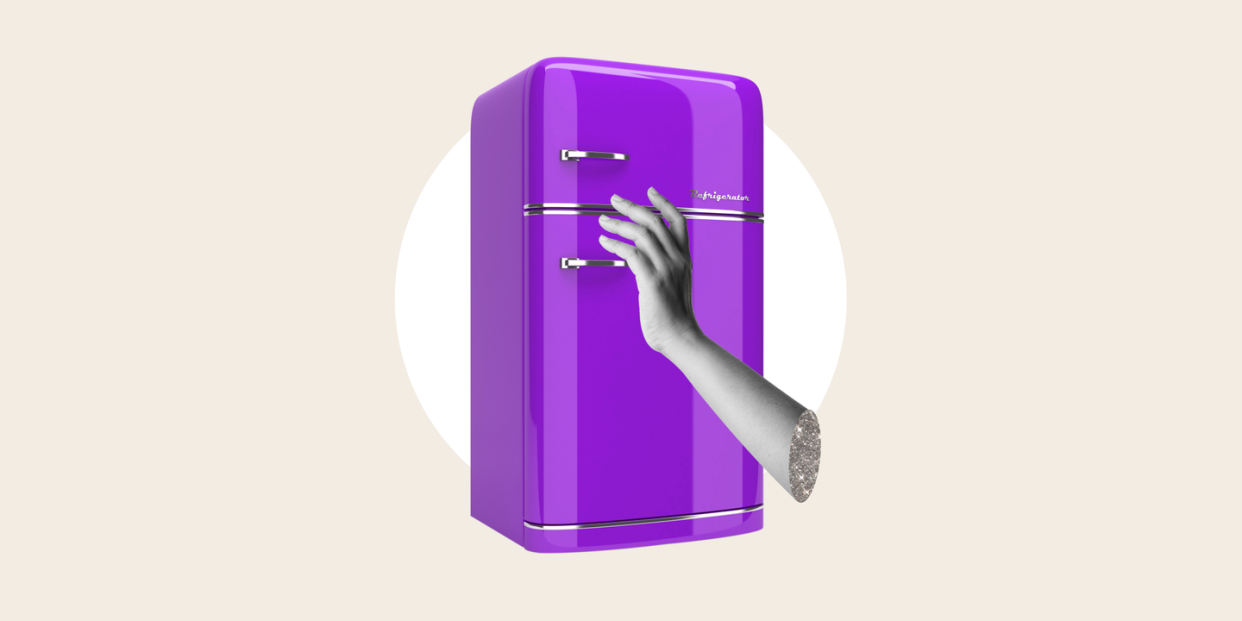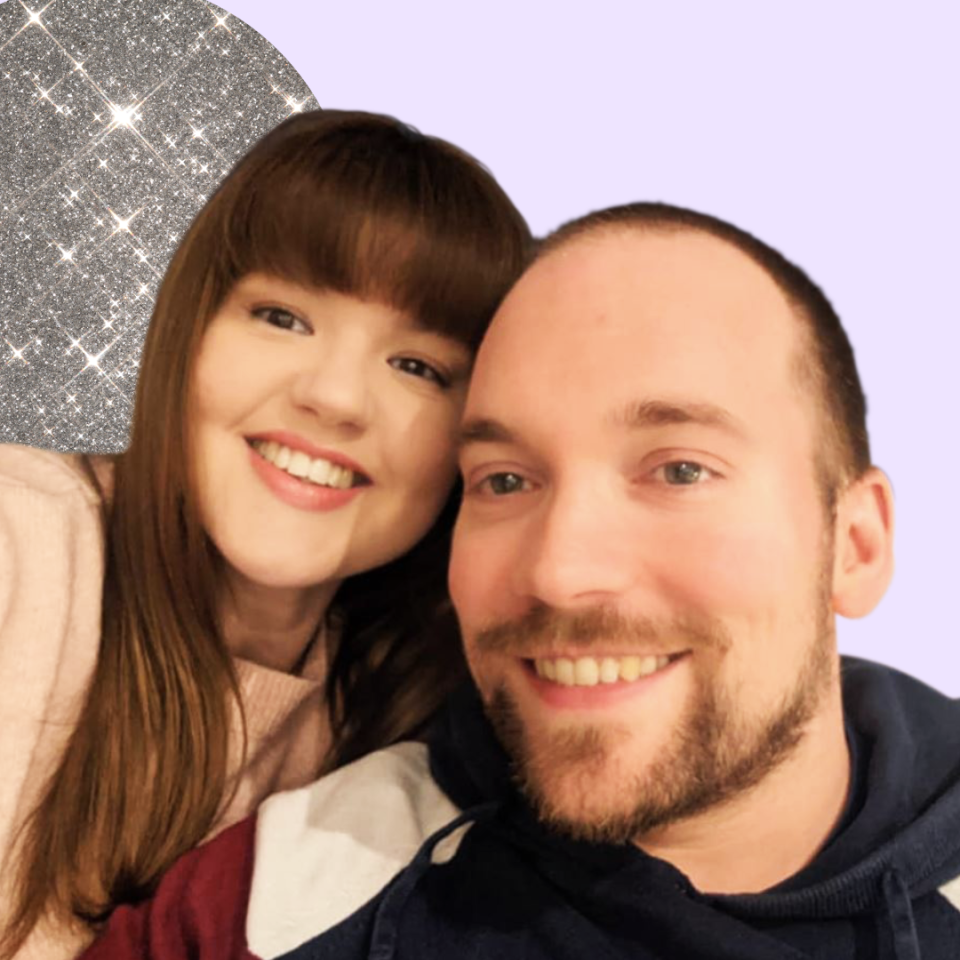"It took years for my Binge Eating Disorder to be diagnosed"

The very first time I heard about Binge Eating Disorder (BED) was the day I was diagnosed with it, at the age of 30 – after countless visits to countless doctors (which usually ended in me being given a discounted gym membership or feeling dismissed), it was such a relief to have a name for the battle I'd been going through.
My eating habits at the time were deeply unhealthy. Although I grew up in a loving home, I can remember, as far back as the age of six, overhearing diet talk and weight-shaming taking place, and the women in my family speaking negatively about their own bodies. The men would comment on their figures too and they all made a fuss over what I ate. I didn't realise it until later on, but that damaging messaging around body image and food crept into my psyche, wreaking havoc, as did my later interactions with men.
When I reached the age that I started dating and going to bars with friends, I'd encounter the most humiliating comments – I don't want to generalise, but in my experience they sadly were all from men. Once I was even spat at whilst waiting for a train and told to kill myself, simply because I inhabited a bigger body. Despite remaining a very chatty and outgoing person, somewhere along the line all of that fed into me feeling unworthy of love – and those emotions would spill over into my eating.
For years I'd oscillate between secretly gorging on food and feeling out of control, which would then cause me to gain weight and have a higher BMI, to extreme calorie-cutting, sometimes forgoing food (or food groups) entirely, which would see me shrink back down at an alarming rate. Generally, the food that I'd restrict then became the thing I would later binge on.

To the outside world, I looked like a typical yo-yo dieter and during my slimmer phases (in which I'd also abuse exercise), people would praise me for being an "inspiration" and say I looked "amazing", again denting my already rocky self-esteem. Was I not worthy if I was bigger?
At points, I'd sacrifice seeing my friends if it interfered with my time in the gym, or because my confidence was so non-existent, and fell into a pattern of dating men who would regularly put me down, but because I believed I deserved that and would never find anything better, I accepted it.
All of this negativity fed back into the cycle that I found myself trapped in for years, one where my emotional triggers saw me pin-balling between over and under-eating – until one day, I moved to a new area and got a new GP, who for the first time made me feel seen and heard. She looked at me clearly after I'd described all my symptoms and said, "I'm not an expert, but I think you have BED and I'm going to refer you on to a specialist." That was the day everything changed for me.
What is Binge Eating Disorder and how is it treated?
Binge Eating Disorder, like any eating disorder, is a serious mental illness and can affect anybody of any age, gender, ethnicity or background. Evidence suggests it's more common than other eating disorders, however awareness around it is relatively poor and because many sufferers will have a higher BMI, they can be overlooked or dismissed (like I was) for not looking like a 'typical' patient. However, as we know, eating disorders are rooted in the mind, not the body, so even though losing or gaining weight can be a symptom, it's not the disease or cause itself.
Some people with BED find they can't remember the food they've eaten after a binge, or say they feel disconnected from the experience, and eat until they're uncomfortably full. Unlike bulimia, those with BED don't tend to purge afterwards (and although I did on occasion, it wasn't a key feature of my disorder).
Recovery is possible though, which is why I'm so passionate about sharing my story. I'm living proof that if you commit to the treatment (which can be scary at first, as it goes against all the disordered and unhealthy thoughts you've likely become accustomed to), you can change your life. After that GP appointment, I had an assessment in a specialist clinic who told me I had a textbook case of BED – and set me up on a treatment plan.
At first I was afraid of what I might start thinking about if the negative voice in my head, telling me to eat (or not eat) and putting me down, was 'cured'. There'd be a big empty space that it had occupied for years and I'd almost become comfortable with that, as it was so familiar.
But still, I embarked on a course of CBTE (a form of Cognitive Behavioural Therapy) and dug deep into my past and my emotions with a therapist, which is how I came to the eye-opening realisation that this feeling that I was unlovable was at the core of a lot of my problems. Having that knowledge allowed me to look at my disordered and unhealthy thoughts with greater perspective. My therapist guided me through exercises that showed me I am worthy of love. We all are, but you have to believe it yourself first.
I remained an outpatient for 20 months, until, in December 2016, I was officially free of all eating disorder-related behaviours. I kept attending sessions for a further six months, just to check that I wasn't only going through a 'good patch' and towards the end of my treatment, the therapist played back tapes from some of our early sessions and I cried when I heard myself speak. I felt completely different and far more in control.
Now, when those intrusive and negative thoughts, or bad habits, creep in, I'm better able to identify them and shut them down. One prime example of this was when I found myself standing in front of the fridge while cooking dinner, which was full of BBQ leftovers, and feeling like I wanted to eat them all. I took a moment to work out why I was feeling that way and unpick it with my logical mind, and realised it was my old nemesis: feeling unloved.

It sounds stupid but that feeling had sparked because my then-partner had watched an episode of a series we were both enjoying together without me. It'd be a minor annoyance to most people, but to me it set off a chain reaction in my head of 'Oh, well he clearly wasn't thinking about you when he did that, he doesn't love you'. Previously, that would've sparked a binge, but now I'm in the driving seat. I closed the fridge door and went back to cooking dinner. That relationship has since ended and I'm now with a wonderful man named Paul, who is also incredibly supportive and understanding of my mental health.
I always say that much like an alcoholic, my eating disorder will be with me for life. Hearing diet talk and culture still effects me, but I work hard not to let it. The language we use around food being 'good' or 'bad' can be so damaging, but it's not a biscuit's fault you have an eating disorder, they're just food. They don't have an inherent morality. It's a mental illness, plain and simple.
Sadly the outside world is still full of external factors and weight bias against larger people, which in turn reinforces any negative thoughts about yourself that you may already have. It's a minefield – and if you're struggling, or any of my experience sounds familiar, my best piece of advice I have would be to contact Beat, the leading charity for people with eating disorders, for support. They can even give you information sheets about Binge Eating Disorder that you can take to the doctor's with you.
You're not alone and you are worthy of love, support and recovery.
What are the symptoms of Binge Eating Disorder?
The NHS website states that typical symptoms include:
Eating when not hungry
Eating very fast during a binge
Eating alone or secretly
Feeling depressed, guilty, ashamed or disgusted after binge eating
It adds that causes can include, but aren't limited to:
You or a member of your family having a history of eating disorders, depression, or alcohol or drug misuse
Being criticised for your eating habits, body shape or weight
Feeling worried about being slim, particularly if you also feel pressure from society or your job, for example, ballet dancers, models or athletes
Having anxiety, low self-esteem, an obsessive personality or are a perfectionist
Being sexually abused
Beat is the UK's leading charity dedicated to helping people with eating disorders. If you or someone you know is struggling and want to seek help, call their helpline on 0808 801 0677 or visit their website for more details.
You Might Also Like

 Yahoo Movies
Yahoo Movies 
